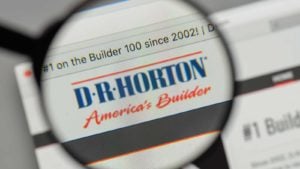
The U.S. housing market has remained surprisingly resilient coming out of the Covid-19 pandemic. The economic recession that has been predicted for more than a year now has not arrived, keeping buyers on the hunt for new homes. And while higher interest rates have led many homeowners to sit tight and put off listing their property for sale, this has led to a shortage of inventory, resulting in bidding wars. Home prices have soared up to all-time highs across the U.S. this summer, hitting record levels in 30 out of 50 markets according to data from real estate tracking firm Black Knight (NYSE:BKI).
At the same time, the American housing market is currently short nearly four million units based on estimates from Freddie Mac. This has made it a very good time to be a homebuilder in the U.S. Yet many economists say the current housing market is fragile and could quickly turn southward should interest rates continue to rise or a feared recession take hold. This makes it a good time to evaluate any holdings one has in stocks of homebuilders. Most of these have enjoyed big runs over the last 12 months, resulting in profits ready to be taken off the table.
Here are three homebuilder stocks to sell in August before they crash and burn.
PulteGroup (PHM)

Things are looking extremely frothy with shares of PulteGroup (NYSE:PHM). The third-largest home-construction company in the U.S. has seen its share price more than double (up 102%) over the last 12 months. In 2023, PHM stock is up 85%, bringing its five-year gains to nearly 200%. Shareholders may want to take some profits in this name now before the stock takes a breather. There were recent reports that company insiders have been selling their shares, making now a good time for outside investors to do the same.
To be sure, PulteGroup reported strong second-quarter financial results, including a revenue of $4.19 billion which beat Wall Street’s forecast of $3.96 billion. Earnings per share amounted to $3.21, which was ahead of consensus forecasts for $2.47.
However, PulteGroup’s stock is now trading right at its all-time high after rising 5% after the Q2 report. It’s a question of when the share price pulls back after such a big run, not if. And the housing market looks to be at its peak currently. This is a risky homebuilder stock.
DR Horton (DHI)

Now for the biggest homebuilder in the U.S., DR Horton (NYSE:DHI). The company, which builds more than 80,000 new homes a year across 29 states, has seen its stock rise a hefty 60% over the last 12 months. That includes a nearly 40% gain so far this year. Looking out five years, DHI stock has increased 180%. Like the other securities on this list, DR Horton’s stock is currently trading right around its all-time high. Can the stock have much more runway ahead after posting such big gains?
The answer may be “no,” judging by the reaction to the company’s Q2 print. Despite beating analyst expectations on the top and bottom lines, and lifting its forward guidance, DHI stock tumbled 6%. The reason for the pullback is that, while DR Horton beat analysts forecasts for this year’s second quarter, its results were actually down from the same period of 2022 with EPS decreasing 16.5%. The company’s margins in Q2 fell to 18.3% from 24.8% a year ago. This is a homebuilder stock to sell before it crashes.
On the date of publication, Joel Baglole did not have (either directly or indirectly) any positions in the securities mentioned in this article. The opinions expressed in this article are those of the writer, subject to the InvestorPlace.com Publishing Guidelines.





